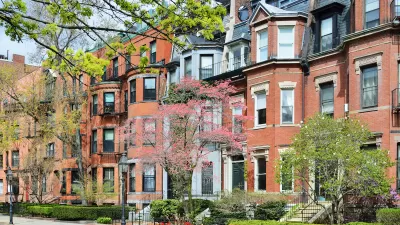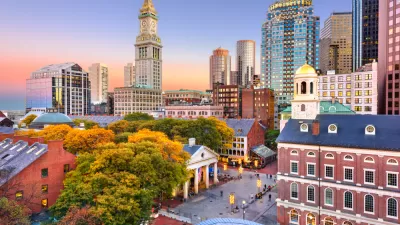A Boston ordinance could make it easier for residents to take up urban beekeeping.

Boston’s city council will consider a zoning reform that addresses a somewhat uncommon land use issue: beekeeping.
According to Scot Lehigh, writing for the Boston Globe, a city council member introduced an ordinance that would shift beekeeping regulations from the zoning code to a municipal ordinance, lifting a ban on new beekeeping operations while continuing to regulate the practice. City Councilor Ruthzee Louijeune, who introduced the ordinance, said the city’s overly complicated zoning code “make[s] it really hard for people to follow the law.”
Lehigh writes that “There are several lessons that the City Council should learn from the recent spotlight on bee regulations.” Aside from passing the beekeeping ordinance, the council should examine other rules that are too complex to be useful and work to eliminate red tape. “Indeed, whether it’s beekeeping, complicated parking rules, or installing new benches, people may often find themselves breaking the rules — not because they want to but because the rules are simply hard to understand or keep track of.”
FULL STORY: When zoning is a buzzkill

Maui's Vacation Rental Debate Turns Ugly
Verbal attacks, misinformation campaigns and fistfights plague a high-stakes debate to convert thousands of vacation rentals into long-term housing.

Planetizen Federal Action Tracker
A weekly monitor of how Trump’s orders and actions are impacting planners and planning in America.

San Francisco Suspends Traffic Calming Amidst Record Deaths
Citing “a challenging fiscal landscape,” the city will cease the program on the heels of 42 traffic deaths, including 24 pedestrians.

Defunct Pittsburgh Power Plant to Become Residential Tower
A decommissioned steam heat plant will be redeveloped into almost 100 affordable housing units.

Trump Prompts Restructuring of Transportation Research Board in “Unprecedented Overreach”
The TRB has eliminated more than half of its committees including those focused on climate, equity, and cities.

Amtrak Rolls Out New Orleans to Alabama “Mardi Gras” Train
The new service will operate morning and evening departures between Mobile and New Orleans.
Urban Design for Planners 1: Software Tools
This six-course series explores essential urban design concepts using open source software and equips planners with the tools they need to participate fully in the urban design process.
Planning for Universal Design
Learn the tools for implementing Universal Design in planning regulations.
Heyer Gruel & Associates PA
JM Goldson LLC
Custer County Colorado
City of Camden Redevelopment Agency
City of Astoria
Transportation Research & Education Center (TREC) at Portland State University
Jefferson Parish Government
Camden Redevelopment Agency
City of Claremont





























